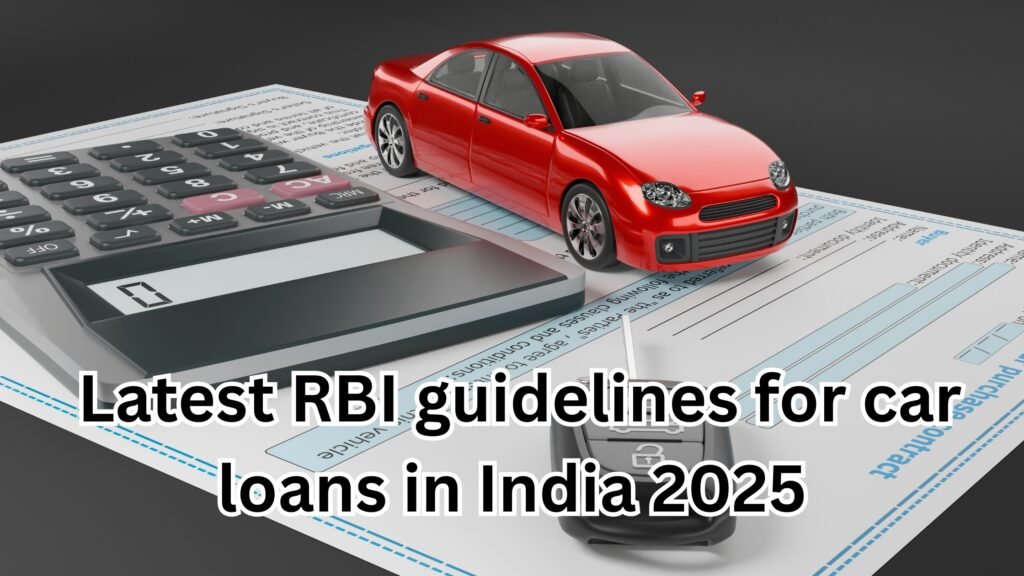Buying a car on loan is one of the most common financial decisions made by working professionals in India. However, very few people understand the rules and protections set by the Reserve Bank of India (RBI) when taking a car loan. These guidelines are in place to ensure fair lending, transparency, and borrower rights.
Understand the latest RBI guidelines for car loans in India 2025. Learn your rights, rules on foreclosure, interest rates, and how to avoid hidden charges before applying for a car loan.
In this article, we’ll explain RBI’s latest car loan guidelines (2025) in simple terms so you can make a confident and informed decision.

Why RBI Guidelines Matter in Car Loans
The Reserve Bank of India (RBI) regulates all banks and financial institutions in India. This means
- It ensures lenders do not overcharge
- It protects borrowers from hidden charges or mis-selling
- It enforces transparency in loan terms and foreclosure
Understanding these rules helps you avoid bad loan decisions, high EMIs, and legal disputes.
Key RBI Guidelines for Car Loans (2025)
1. No Compulsory Bundling of Insurance or Accessories
Banks and dealers cannot force you to:
- Buy insurance from a specific company
- Buy accessories or add-ons with your loan
🔗 RBI Circular on Fair Lending Practices
Tip: You are free to choose your car insurance provider.
Check out: Compare Car Insurance Plans in India—2025
2. Clear Disclosure of All Charges
According to RBI rules:
- Banks must provide a written statement of all charges: processing fee, interest rate, foreclosure penalty, etc.
- You should receive a sanction letter clearly stating the loan terms.
If this is not provided, you can complain to the RBI’s Banking Ombudsman.
3. Prepayment and Foreclosure Rules
- RBI does not restrict foreclosure, but many banks charge a fee.
- Lenders must inform about any charges for part-payment or early closure.
- For floating interest loans, the RBI recommends zero foreclosure charges.
Check your loan documents before signing. Some banks silently add a 3–5% prepayment penalty.
4. Credit Score Should Not Be Shared Without Consent
RBI has instructed lenders to take written permission from you before pulling your CIBIL score or sharing loan data with third parties.
If your score is pulled without permission, it violates your data privacy rights under RBI rules.
5. No Misleading EMI Schemes
Some dealerships offer “zero interest” or “no EMI for 6 months” schemes. RBI mandates that:
- All such offers must disclose the actual interest structure.
- Hidden charges or inflated car prices to adjust interest are considered unfair practices.
6. Repossession Rules in Case of Non-Payment
If you default on your car loan:
- Banks must give you a formal notice before repossessing the vehicle.
- A cooling-off period must be given to settle dues.
- Repossession without warning is illegal under the SARFAESI Act and RBI rules.
Learn more: RBI Guidelines on Asset Recovery Agents
7. Grievance Redressal System Mandatory
Every lender must have a dedicated grievance redressal cell to handle loan-related complaints.
If not resolved, you can file a complaint directly at the RBI’s Complaint Management System (CMS):
🔗 https://cms.rbi.org.in
Documents Banks Must Provide You (As Per RBI)
- Sanction letter with interest rate and EMI details
- Schedule of charges
- Loan agreement (signed copy)
- Repayment schedule
- Statement of account
- No-objection certificate (after loan closure)
What Borrowers Should Do—RBI-Compliant Tips
- Always compare loans using written quotes, not verbal offers.
- Read the entire loan agreement before signing.
- Avoid zero-down payment offers unless EMI and charges are transparent.
- Never accept verbal interest rate promises—insist on written proof.
- Ask for your credit score and eligibility proof before final approval.
Common Mistakes Salaried Borrowers Make
- Letting dealers arrange loans without checking bank terms
- Ignoring hidden charges like documentation or service fees
- Not checking for foreclosure flexibility
- Not keeping copies of signed loan documents
Avoid these pitfalls by reading
Best Car Loan Plans for Salaried Professionals—2025.
Final Thoughts
The RBI’s car loan guidelines are designed to empower buyers with transparency, flexibility, and protection. If you’re a salaried professional planning to buy a car in 2025, knowing your rights under RBI laws will help you make smarter and safer financial choices.
For detailed help with EMI calculations, check our
Car Loan EMI Calculator Tool